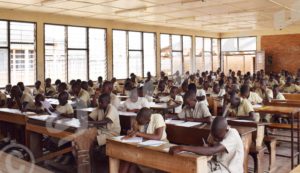Parents of students at Karurama I Basic School in Rugombo Commune of Cibitoke north-western province of Burundi denounce the large number of students in one class.

Pupils doing test admitting them to attend schools of excellency in Bujumbura
At 9 a.m., pupils of grade 1 at Karurama Fundamental School are studying. The teacher struggles to teach the lesson prepared for the day. Four pupils share one desk while others attend courses sitting on the floor. This school has more than 2000 students and each class has more than 140 students.
Marie Nizigiyimana, a teacher in grade 1, says she deplores the conditions in which students learn. “Some pupils sit on the desks while others sit on the floor. I am unable to complete the lesson as planned because of their very high number,” she says.
Emmanuel Ndikumana, the headmaster of Karurama I Basic School says he is not able to solve that problem alone. “I cannot resolve this problem of lack of desks and the large number of students in class,” he says. He also admits that the high number of students in class is an impediment to pupils’ success arguing that teachers cannot keep up with all students.
A parent of a student studying at this school accuses Cibitoke province authorities of refusing parents’ contributions to improve the studying conditions of their children. “We urge the authorities to allow us to build few classes to decrease the number of students in classes,” says the parent.
Egide Ngendambizi, the Provincial Director of Education in Cibitoke explains that the high number of students at Karurama I Fundamental School is due to the fact that some students leave the schools located in villages to study in urban centers. He says that besides the big number of student in one class, the school faces the lack of textbooks and teachers. “I have requested the Ministry of Education to solve this issue. I hope that the government will employ other teachers to deal with this problem,” says Ngendambizi.



















 IWACU Open Data
IWACU Open Data

